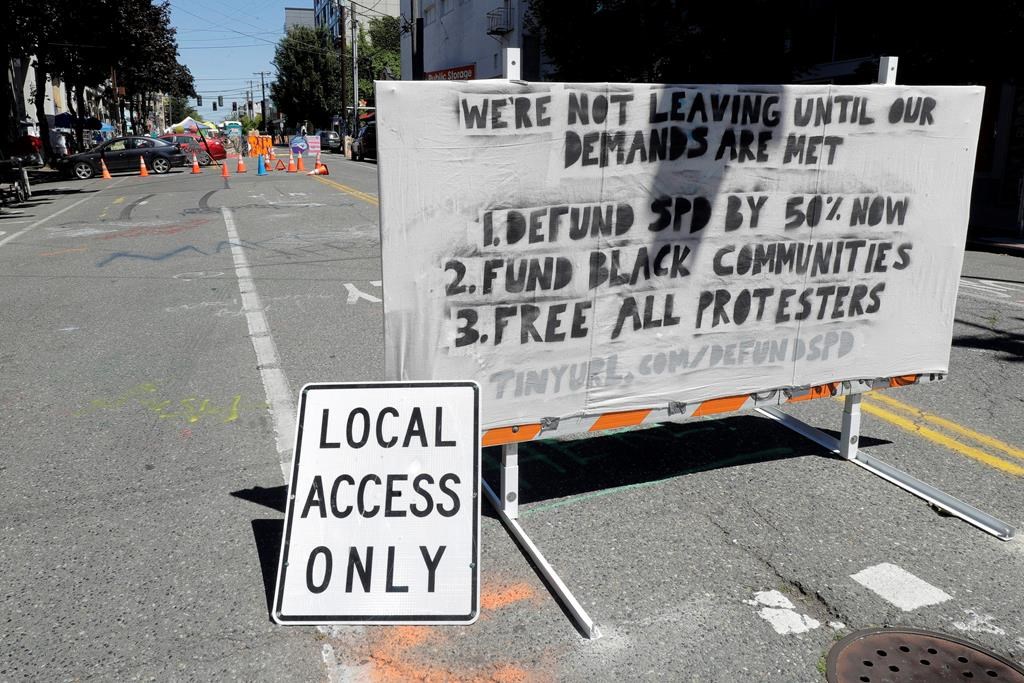Faced with growing pressure to crack down on an “occupied” protest zone following two weekend shootings, Seattle’s mayor said Monday that officials will move to wind down the blocks-long span of city streets taken over two weeks ago that President Donald Trump asserted is run by “anarchists.”

Mayor Jenny Durkan said at a news conference that the violence was distracting from changes sought by thousands of peaceful protesters seeking to address racial inequity and police brutality. She said the city is working with the community to bring the “Capitol Hill Occupied Protest” zone to an end.
“The cumulative impacts of the gatherings and protests and the nighttime atmosphere and violence has led to increasingly difficult circumstances for our businesses and residents,” Durkan said. “The impacts have increased and the safety has decreased.”
A shooting Sunday night was the second in less than 48 hours at the edge of the zone, named for the Capitol Hill neighborhood near downtown that emerged during nationwide protests over the police killing of George Floyd.
The 17-year-old victim, who was shot in the arm, declined to speak with detectives, police said. Gunfire early Saturday left a 19-year-old man dead and another person critically wounded. It was not apparent if the shootings had anything to do with the protest.

Protesters cordoned off the several-block area, known as CHOP, near a police station after clashes with officers. Seattle riot squads unleashed tear gas, pepper spray and flash-bangs on large crowds of mostly peaceful protesters, drawing condemnation from many city leaders and a federal court order temporarily banning the use of the weapons on demonstrators.

Get breaking National news
After police largely abandoned the East Precinct building, protesters took over the area — with demonstrators painting a large “Black Lives Matter” mural on the street, handing out free food, playing music and planting a community garden. Its existence incensed Trump, who criticized Seattle Mayor Jenny Durkan and Washington Gov. Jay Inslee, both Democrats.
Peacefulness has prevailed during the day. On Monday, people lounged on the turf at a park, while volunteers handed out food, water and toiletries. Artists painted designs on wooden barricades, and a few candles burned in front of a sign on the police precinct listing people killed by officer.
At night, however, the atmosphere becomes more charged, with demonstrators marching and openly armed volunteer guards keeping watch. Among the demands are calls to shift funding for police to community health or other social justice causes.
Durkan said she planned to announce a plan Monday for addressing public safety in the area.
“After days of peaceful demonstrations, two nights of shootings have clearly escalated the situation on Capitol Hill,” Durkan’s office said in a statement. “We have been meeting with residents and small business owners to address their safety and disorder concerns, including the ability of first responders to access emergencies in the area. … As many community groups are also urging, (the) Mayor believes individuals can and should peacefully demonstrate, but the message cannot be lost in the violence.”
Volunteer medics inside the zone brought the victims of Saturday’s shooting to the hospital rather than wait for the police and fire departments, who were preparing to respond before entering.
Demonstrators who had marched to the West Precinct police building downtown were returning to the zone when Sunday night’s shooting occurred, police said. The 17-year-old was treated and released from the hospital and wouldn’t speak with police, the department said. Investigators urged anyone with information to come forward.

Andre Taylor, who founded of the anti-police-shooting organization Not This Time! after his brother was killed by Seattle police in 2016, said Monday that he had warned protest organizers that the city would need to retake the area because of the violence.
“That CHOP area is attracting this kind of activity and it’s unsafe,” Taylor said in a Facebook video. “I told them, ’All those people that were supporting you guys, they’re going to start walking away from you, especially all those white people that were following you. … They don’t want to be associated with any part of that violence.”
Former U.S. Rep. Dave Reichert, a Republican who previously served as sheriff in the county where Seattle is located, also called on the city to take back control.
“Elected officials have abandoned the rule of law and their oath to protect and defend our communities,” he wrote in an opinion piece for Washington State Wire, a website devoted to state political news. “They have abandoned their law-abiding citizens and have been cowardly bullied into surrendering the East Precinct – and multiple city blocks.”
Associated Press photographer Ted Warren in Seattle contributed.








Comments